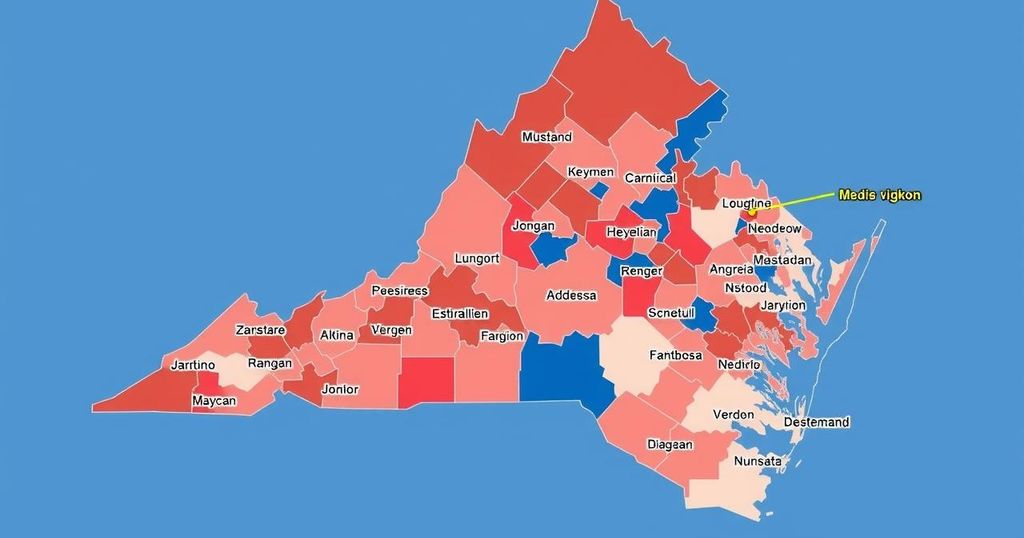Special Elections in Virginia: Key Races that Could Shift Legislative Control

Voters in Loudoun County and central Virginia will cast ballots Tuesday for two state senators and a House of Delegates member during critical special elections. Republicans hope to gain control from Democrats, though analysts predict challenges due to the Democratic leanings of the region. Key races involve candidates with vastly different positions on issues such as abortion and educational policies, which could significantly impact the legislative direction in the upcoming session.
On Tuesday, voters in Loudoun County and a section of central Virginia will participate in special elections to elect two state senators and a member of the House of Delegates, coinciding with the commencement of the General Assembly session on Wednesday. Republicans are hopeful of gaining control of both chambers by flipping the two Loudoun County seats; however, analysts believe such an outcome is unlikely given the predominately Democratic electorate in Northern Virginia. On the other hand, Democrats face limited prospects of increasing their tenuous Senate majority by winning the seat vacated by McGuire in a predominantly Republican, rural district stretching from the western suburbs of Richmond to Lynchburg.
Historically, special elections can produce unexpected results due to lower voter turnout, which may affect party dynamics. Republican successes in either legislative chamber could significantly influence the agenda of Governor Glenn Youngkin (R), who is in his final year of office. Democrats, having retained control of the Senate since Youngkin assumed office in January 2022, have consistently opposed his initiatives, particularly after regaining control of the House in 2023.
Currently, the Democrats maintain a narrow 21-to-19 majority in the Senate, and their loss of the seat formerly held by Subramanyam would strip them of effective control, considering the presiding Republican Lt. Governor Winsome Earle-Sears could break ties. Meanwhile, the House reflects a 51-to-49 Democrat advantage until the resignation of Delegate Kannan Srinivasan (D-Loudoun) is fully realized, which could necessitate a power-sharing arrangement with Republicans if they win the seat.
Early voting for these elections commenced on December 11 for the Loudoun races and on December 27 in central Virginia, concluding on Saturday. Voters will be able to cast their ballots on Tuesday from 6 a.m. to 7 p.m. In the Loudoun Senate contest, Srinivasan is running against Tumay Harding, a former educator critical of the local school system. Srinivasan, who won his House seat in November 2023, has emphasized his commitments to mental health, fentanyl issues, and consumer protection, inspired by personal experiences that fueled his involvement in politics.
His opponent, Harding, the daughter of immigrants, brings a background as a teacher and a cargo company executive. She aims to counter progressive policies in Richmond, specifically on issues related to transgender rights. The two candidates display contrasting stances on abortion, with Srinivasan advocating for reproductive rights and Harding promoting a conception-based definition of life and a ban on late-term abortions.
In the race for the open House seat, Democrat JJ Singh and Republican Ram Venkatachalam are contesting. Singh, a former economic adviser, prioritizes amending the state’s constitution to secure abortion rights, enhanced gun control, and addressing climate challenges. Conversely, Venkatachalam, an IT consultant, emphasizes economic opportunities and quality education, distancing himself from polarizing matters.
In the central Virginia seat vacated by McGuire, Republican Luther Cifers, a political newcomer, is running against Democrat Jack Trammell, a professor and author with a focus on promoting rural economic development. As both candidates articulate their priorities, significant issues such as affordable housing, education, and stringent laws around drugs and guns remain at the forefront.
Virginia’s political landscape is shifting with important elections that could affect party control within the state legislature. Special elections often yield unpredictable results due to lower voter turnout, particularly outside the main electoral calendar. These elections are critical as they may alter the balance of power between Republicans and Democrats, now intensifying as Republicans aim to reclaim legislative seats in traditionally Democratic regions. As the state approaches its 2024 goals outlined by the incumbent Governor Youngkin and the Democratic-controlled assembly, the outcomes of these elections will be pivotal for policy direction moving forward.
The upcoming special elections in Loudoun County and central Virginia emphasize the contentious political landscape leading up to the General Assembly session. As pivotal seats are contested, the potential for party control to shift underscores the significance of voter turnout and engagement. With contrasting ideologies being presented in the candidates’ campaigns, the results could facilitate substantial changes in legislative priorities and governance in Virginia.
Original Source: www.washingtonpost.com







